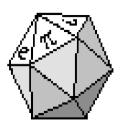Yahoo Answers is shutting down on May 4th, 2021 (Eastern Time) and the Yahoo Answers website is now in read-only mode. There will be no changes to other Yahoo properties or services, or your Yahoo account. You can find more information about the Yahoo Answers shutdown and how to download your data on this help page.
Trending News
Need help in math. College Algebra?
Factor
a squared b squared+ c squared is it prime?
4x squared+9
1 Answer
- MorewoodLv 710 years agoFavorite Answer
It is "irreducible" (prime) over the real numbers.
Remember the factor theorem? For a number "r", (x-r) will be a factor of a polynomial p(x) if and only if p(r)=0.
In your polynomial: 4x²+9≥9>0 (since x²≥0) for all real numbers "x". No zeros means no linear factors (wth real numbers for coefficients).
-----
However, IF you allow square roots of negative numbers:
4x² + 9 = 0
⇒ 4x² = -9
⇒ x² = -9/4
⇒ x = √(-9/4) or x = -√(-9/4)
Then [x-√(-9/4)] and [x+√(-9/4)] are factors, along with the constant "4".
Allowing square roots of negative numbers extends the real number system to form the "complex numbers", which you may not have studied yet. They are very important in a number of areas, including electronics. The "Fundamental Theorem of Algebra:" says that only linear polynomials are irreducible (prime) when you allow complex numbers.
Source(s): Read more about irreducible polynomials: http://en.wikipedia.org/wiki/Irreducible_polynomia... But beware, this gets into some very deep math very quickly. Even proving the Fundamental Theorem of Algebra is only easy using very powerful tools!


